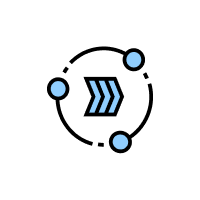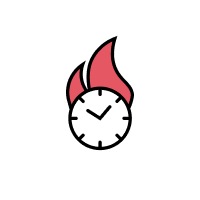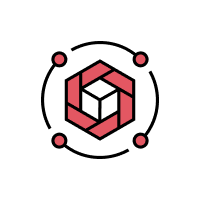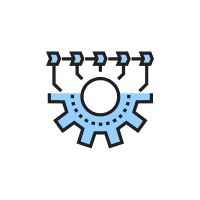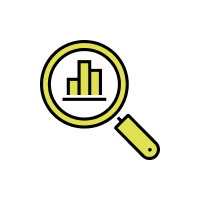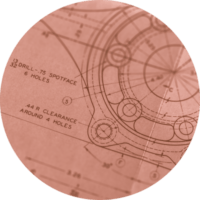Case Studies
Auto Parts, Tire Manufacturing: Standardization and Intelligent Automation Increase Production, Slash Downtime
Top 3 Global Tire Manufacturer
Location:
North AmericaProject Background
The company, a top-3 global tire manufacturer, was battling low-cost competitors who were overtaking the low-price end of the North American tire after-market. At the high-price end, effective marketing operations, high-quality product, and strong brand recognition kept these new entrants at bay. Even so, high-end customers pushed for lower pricing. Industry margins were so thin that a one-percent cost reduction could deliver a meaningful competitive gain in market share.
Corporate execs commissioned a cost benchmarking study by a prestigious strategy-consulting firm. Although light on specifics, the findings vaguely indicated an opportunity to reduce manufacturing costs by 20 percent. Skeptical of the number, senior management cut this figure in half and issued a directive to increase productivity by an aggressive 10 percent—quickly, without capital investment.
Operations executives were frustrated. Production equipment was nearly state-of-the-art. And they maintained numerous, internal, lean consulting teams at every plant. They believed they had exhausted every opportunity to increase employee productivity on the plant floor. The group was out of new ideas.
As they considered stepping up investment in existing approaches, the Senior Vice President of production operations for North America pointed out that knowledge worker processes always escaped scrutiny. Daily experience proved that these non-plant processes directly influenced shop-floor productivity: schedule changes, production targets, and more. Executives felt there might be opportunity in looking at plant operations in this more broadly-defined context. The SVP contacted The Lab to learn more about knowledge work standardization.
Project Overview
Project Sponsor: SVP Technology, Manufacturing & Procurement
Client: Top 3 Global Tire Manufacturer
Implementation Results
-
Throughput: Up 25%
-
Non-operating time: Down 30%
-
Material waste/recycle: Down 20%
-
Annual savings: $11M
-
Break-even point: 6 mos.
-
ROI (12 month): 8x
Client Description, Project Scope, Objectives
For over a century, the company has operated production plants around the world, supplying original equipment to manufacturers and replacement products to aftermarkets. Management routinely acquired the latest technology for manufacturing production, as well as operations management, e.g.,
- Enterprise resource planning (ERP)
- Scheduling
- Shop-floor management
- Maintenance
- Logistics
- And many more
The SVP and his management team directed The Lab’s initiative toward its newest, most efficient U.S. facility, staffed by over 1,500 employees.
Executives embraced lean management methods pioneered by Toyota in the 1970s. However, they conceded that execution in North America was not as disciplined as other parts of the world. And these methods had always been plant-floor focused. They’d never been broadly applied, end-to-end, across the enterprise to include both knowledge work as well as production work. Consequently, this became the scope of initiative.
To develop this comprehensive documentation, the scope included inputs and interactions across the organization that also influenced this plant:
- Sales and Operations Planning (S&OP)
- Network product-to-plant allocations
- Capacity planning
- Productivity targets
- Others
The Lab’s standardization improvement templates rapidly documented end-to-end business processes in granular, activity-level detail—within weeks.
Initiative Objectives:
-
Increased production
-
Waste reduction
-
Lean process improvement
Project Scope:
- Material handling
- Production
- Maintenance
- Scheduling
Overview: Phase I, Analysis and Design
The initiative began with an eight-week Phase I analysis covering the major end-to-end business processes for plant operations, as well as selected non-plant, “knowledge work” business processes, including:
- Plant Operations Processes
- Mixing
- Stock Cutting
- Tire Building
- Curing
- Final Inspection
- Knowledge Work Processes
- Material Handling
- Scheduling
- Maintenance
- Quality Control
- Industrial Engineering
The Lab’s inventory of process-standardization templates enabled rapid comparison and assessment of the client’s current-state, end-to-end business processes, encompassing wall-to-wall plant operations as well as major non-plant business processes—from network scheduling and plant allocations through plant management, shop floor manufacturing, and internal distribution.
This detailed analysis of business processes documented more than 85 percent of employee work activities (approximately two minutes each, on average) and related information, including:
- Industry standard key performance indicators (KPIs)
- Related data elements
- Data structures (taxonomies)
- Performance benchmarks
- Best practices
- Automation “use cases”
The Lab’s pre-structured approach saves time, typically requiring only one hour per week of participation by client subject-matter experts (SMEs). To rapidly and cost-effectively cover the broad, multi-national scope of the non-plant, knowledge work business processes, The Lab and the client management team jointly developed a “frugal analytical footprint.”
Representative organizations, processes, work products, and locations were selected for in-depth documentation and analysis. The analysis was conducted both on-site at the plant and remotely across multiple North American locations.
The results of these efforts were then tested against a larger set of locations to document and quantify exceptions. This approach created high-confidence, enterprise-wide findings for improvements and benefits across the North American network.
Assets & Deliverables: Phase I, Analysis and design
-
Assets & Deliverables: Phase I, Analysis and Design
-
10+ major end-to-end business processes documented at nano-scale detail
-
195+ process-standardization opportunities identified
-
80+ automation candidates identified
-
75+ advanced analytics and KPI use-cases identified
-
Upgraded dashboards and reports (financial, operational)
-
AI/ML driven alerts and recommendations
-
Improved insights: operational, strategic
-
Phase II: Standardization Implementation
Improvements implemented throughout the plant ranged widely in scope. These included seemingly insignificant, mundane changes like converting free-text fields in software applications to multiple-choice (standardized), drop-down menus. Other changes were larger and impossible to ignore—like revising the storage of work-in-progress.
The most valuable opportunities involved standardizing selected knowledge-work business processes as rigorously as the operations on the shop floor: Production scheduling, capacity management, unplanned maintenance, and more.
Once these work activities were standardized, many could be automated by migrating them to existing systems: ERP, CRM, scheduling, and others.
Tire Manufacturing Improvement Examples: Phase II Implementation
The Lab documented more than 195 opportunities across the ten-plus business processes reviewed. Related improvements were organized into major implementation work streams, including the three examples below.
1. Reduced Down Time.
Using free-text fields, operators typed in thousands of inconsistently defined “root cause” reasons describing why their machines were not operating. Consequently, this database was never compiled, analyzed, or even used.
The Lab analyzed these entries and implemented a standardized, simplified set of drop-down, multiple-choice menus of root causes for downtime. RPA bots compiled data in real time, delivering central reporting of downtime and its root causes. Productivity metrics tracked root-cause-reduction efforts, achieving a 30-percent drop in two months.
2. Slashed Schedule Overrides.
Engineers meticulously and collaboratively developed plant schedules across the North American manufacturing network. But numerous plant foremen—and senior business executives—could override these schedules, creating an average of 2,000 undocumented daily modifications for each plant.
The Lab helped standardize this informal scheduling process into a semi-automated “knowledge work factory” using existing technologies augmented by RPA bots. Schedule overrides required documentation via multiple-choice, drop-down menus and identified the initiating employee. Automated, real-time performance reports linked schedule estimates to actual, end-to-end performance metrics for each plant.
3. Improved WIP Inventory Handling.
To cut costs, low-wage subcontract materials-handlers had been hired to replace experienced, union employees for moving work-in-process (WIP) on the shop floor. This compromised the plant’s “first in, first out” raw materials inventory policy, as inexperienced handlers simply piled new materials in front of old. Storage space was used inefficiently. Tons of feedstock expired and had to be destroyed.
The Lab helped implement a visual, lean-process WIP traffic flow—no reading required. Stock-outs and spoilage declined by over two thirds within ten weeks.
The Lab Makes it Easy
Organization-friendly engagement design
At The Lab, we’ve spent three decades refining every aspect of our transformation engagement model. We’ve made it easy for clients—from the C-Suite to the front line—to understand and manage the initiative:
- Minimal use of client time: One to two hours each week, maximum.
- Measurable benefits: Typical 12-month ROI is 3x to 5x.
- Pre-built templates and tools: Process maps, data models, bots, and more.
- U.S.-based, remote delivery: Nothing is ever outsourced or offshored.
Designed to reduce risk, increase success
Since 1993, The Lab has led the industry in eliminating risk for our clients. Whether your engagement involves a handful of bots or wall-to-wall transformation, we make it easy to do business with us:
- Fixed pricing and clearly defined scope
- Early-out checkpoints and options
- Money-back guarantees
Book your demo today
Rapidly accelerate—and monetize—your strategic initiatives, including process improvement, org design, intelligent automation, analytics, AI, and more.
To book your 30-minute screensharing demo, simply call (201) 526-1200 or email info@thelabconsulting.com

